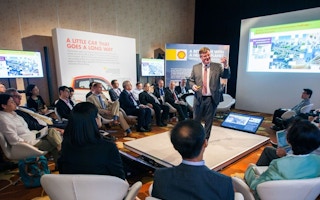Energy giant Shell has identified a need to transform four sectors of the energy system - power, industry, transportation and buildings - for the global economy to achieve net-zero emissions.
To continue reading, subscribe to Eco‑Business.
There's something for everyone. We offer a range of subscription plans.
- Access our stories and receive our Insights Weekly newsletter with the free EB Member plan.
- Unlock unlimited access to our content and archive with EB Circle.
- Publish your content with EB Premium.
The four areas currently generate a large proportion of energy-related CO2 emissions. The power sector, for example, accounts for 40 per cent of global energy-related CO2 emissions.
Shell’s new report “A Better Life with a Healthy Planet: Pathways to Net-Zero Emissions” was a supplement to its earlier report “New Lens Scenarios” published in 2013, which looked at alternative energy scenarios for the future.
Speaking at last month’s Asia launch of the supplement in Singapore, Jeremy Bentham, vice president of global business environment and head of Shell scenarios, said understanding how to bring different forms of energy together was very important.
“There is going to be a co-evolution of the established forms of energy such as oil and gas, which currently keep our factories and supply chains working, with the emerging forms of energy such as solar, wind, bio fuels and hydrogen, which are currently mainly electricity based,” he said.
The report also states that the global drive to achieve net-zero emissions is likely to be accelerated due to the Paris Agreement inked by the world’s nations in December 2015, which sets a limit for the global rise in temperatures to well below 2 deg Celsius.
The report, though, does not provide a time period in which this net-zero emissions target can be achieved.
“
We have to ensure that we remain an attractive investment for shareholders because it’s important to have our own cash flow to invest on behalf of the shareholders in what’s going to be an exciting energy future.
Jeremy Bentham, vice president of global business environment, head of Shell scenarios, Shell
Shell said that for more than four decades, it has continued to explore and build alternative energy scenarios. These scenarios provide possible alternatives and paints different scenarios for the future of the energy industry. However, they are not a prediction of what will happen, the report highlighted.
The energy scenarios will help to set the context and direction Shell is heading towards, as it further explores its own energy mix and pursues efforts to combine renewables such as solar, wind and bio fuels with oil and gas, shared Bentham.
So what does this transformation towards net-zero emissions, also referred to as decarbonisation, mean?
Zero emissions technologies that include renewables and nuclear need to gradually displace coal to become a significant source for the power sector.
The design and operations of buildings, which are responsible for nearly one-third of global energy consumption, will require high energy efficiency standards and should increasingly be powered by renewables.
With 90 per cent of transport powered by oil, individuals will need to increase the use of battery-electric or hydrogen fuel cell cars, as oil and gas are likely to be of dominant use in the foreseeable future of aviation, shipping and long-haul distances.
As for industry, the report suggests that there are no “easy replacements” for heavy industries such as cement, steel and iron. It suggested that technologies such carbon capture and storage (CCS) seems the way forward to reduce emissions from these industries.
Shell’s analysis revealed that by 2035 to 2050, some actions could bring the world to the halfway point of this transition.
This will involve redoubling energy efficiency, continuing renewable energy development - in particular solar and wind - and accelerating the switch from coal to gas to reduce power sector emissions.
The report also emphasised the importance of significant improvements to city infrastructure in order to create low-energy service demand.
To achieve all these, leadership from society, government, and industry is required, especially in pushing for change in alternative energy sources and solutions, the report stressed.
“As the scenarios show, that will take some time to do, but if you chose to do it collectively then it can be done,” said Bentham.
When asked if Shell would lead the industry in changing consumer behaviour in order to move to the net-zero emissions scenario Bentham responded that “Shell never wants to and never can dictate consumer behaviour or choice but can encourage and nudge”.
“We can produce cleaner fuels and better operating lubricants, we can make liquefied natural gas for transport applications… We can work with governments on policies that shape consumer behaviour by bringing what we know of consumer behaviour.
“But we don’t have the right in society to tell people what to do. It comes from a societal dialogue that involves business, government and civil society,” he said.








